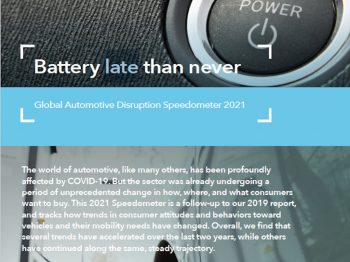UK leads way on ‘unprecedented’ driver aspirations for electric vehicles
The proportion of drivers considering the purchase of an EV is at an unprecedented level, with the UK leading the way among a number of western markets.

The report says the proportion of drivers considering the purchase of an EV is unprecedented, and is likely to translate into a fast acceleration in EV adoption
A new ‘Battery late than never’ report from strategy consultants OC&C says the last two years have witnessed a clear inflection point in attitudes towards electric vehicles and digital retailing, both of which are expected to accelerate sharply in the next three to five years.
The 2021 ‘Speedometer’ research – which follows up OC&C’s 2019 report and tracks trends in consumer attitudes and behaviours toward vehicles and mobility in China, the US, France, Germany and the UK – finds that more than 50% of drivers considered a hybrid when they last changed their car, and over 40% report they will consider a fully electric vehicle next time.
The UK is ahead of the game in the western markets surveyed, with 57% of UK drivers considering fully electric for their next vehicle versus 45% in Germany and the US. But China leads the way overall, with a figure of 85%.
The research also finds that the car itself remains essential: over 80% of drivers in every country still see the car as vital to getting around. And the pandemic has helped cement the importance of the car, though mileage has fallen; 40% of drivers in the US, UK and Italy said Covid has increased their certainty that having their own car is vital.
The rise in interest in cars isn’t just limited to existing drivers; the number of non-drivers who definitely expect to own in the future has risen by 21% in the UK and 14% in the US – while keeping broadly stable elsewhere – due to perceived risks on public transport.
Exclusive access still remains vital to 82% of drivers, with most expressing concerns around accessibility, storage and privacy as key to their reluctance to consider co-ownership or access models.
However, the importance of exclusivity is starting to wane for a forward-thinking minority; 14% of European and US drivers reported that they will consider mobility solutions as an alternative to having their own car, be it car-sharing solutions, taxis or even short term rental – a huge leap from 2019 where in the West the norm was 8%.
The research also finds that the pandemic has helped accelerate the infiltration of online into the purchase journey, with more consumers looking to complete their transaction online.
One in four car buyers now say they would be happy to purchase online and have a car delivered without seeing it first.
The UK and US lead this trend in the West with 27% happy to ‘click and collect’, while China continues to move further ahead of the pack: 55% of Chinese drivers would be happy to do so.
Changing trends in purchase channels also reveal an increase in drivers looking to source cars through their employer; up to 7% from the 2% who used this last time.
Consumers also continue to move from outright purchase towards leasing and finance. While sole access to a car is still critical, ownership is not and the proportion open to leasing continues to grow, including for older vehicles. UK new car buyers are particularly positive to leasing; 41% see leasing as equivalent to – or as desirable as – owning a car.
And after purchase, the research finds the vast majority of consumers are looking for ‘bundles’ of products they already buy, delivering convenience and certainty in an increasingly uncertain world. The most popular items to group together into a subscription are car insurance, servicing & repair and breakdown – more than 30% of drivers in every country report that they would pay more than they currently believe they spend on these in order to have a fixed price, taking the risk out of unforeseen maintenance and service costs. Bundles on car warranties and replacement tyres also sought after by more than 30% of drivers in most countries.
OC&C adds that there is opportunity for the right company to put together a bundle of insurance, roadside recovery and maintenance – and a risk of service providers being disintermediated if they don’t move early.
Commenting on the report, OC&C said: “These changes have the potential to shift the ownership of customer relationships, which will affect every player in the ecosystem and enable innovators to seek new areas to build disruptive offerings.”
The report also provides guidance on the implications of all the changes on the various different sectors of the automotive industry.
The company added: “Auto services businesses are seeing several headwinds affect their medium-to-long-term outlook. Changes in how consumers buy cars may mean these businesses need to evolve their existing routes to market, while also considering how (or if) they create bundles or participate in the bundles of others. In the long term, the rise of EVs will also diminish market size but this is likely to be in part balanced by increasingly complex vehicles.”
To access the OC&C report, click here.

